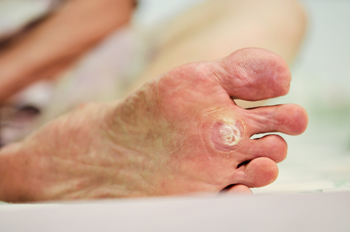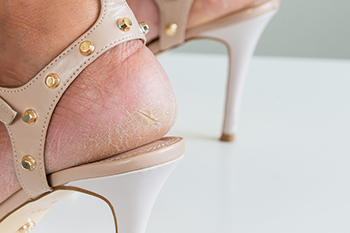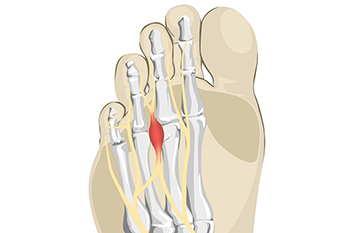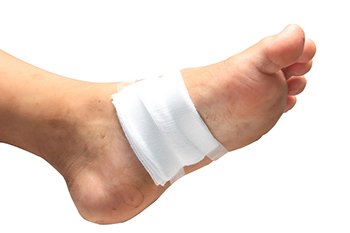Merrillville, IN
Munster, IN
August 2023
Treating and Preventing Plantar Warts

Plantar warts are stubborn growths caused by human papillomavirus, abbreviated HPV, and can be a source of discomfort and frustration. If you are attempting to manage these types of warts, there are effective ways to address them. Over-the-counter treatments containing salicylic acid can help dissolve the warts over time. Alternatively, your podiatrist can use cryotherapy to freeze the warts off. It is important to avoid picking or scratching the warts, as this can spread the virus. To help prevent plantar warts, keep your feet dry and clean, especially in damp environments, such as locker rooms or public showers. Wearing appropriate shoes, such as flip-flops, in communal areas can help to reduce the risk of exposure. If you have developed a plantar wart, it is suggested that you consult with a podiatrist who can guide you toward the treatment method that is right for you.
Plantar warts can be very uncomfortable. If you need your feet checked, contact Ahmad Elsamad, DPM from The Institute of Foot & Ankle Reconstructive Surgery . Our doctor will assist you with all of your foot and ankle needs.
About Plantar Warts
Plantar warts are the result of HPV, or human papillomavirus, getting into open wounds on the feet. They are mostly found on the heels or balls of the feet.
While plantar warts are generally harmless, those experiencing excessive pain or those suffering from diabetes or a compromised immune system require immediate medical care. Plantar warts are easily diagnosed, usually through scraping off a bit of rough skin or by getting a biopsy.
Symptoms
- Lesions on the bottom of your feet, usually rough and grainy
- Hard or thick callused spots
- Wart seeds, which are small clotted blood vessels that look like little black spots
- Pain, discomfort, or tenderness of your feet when walking or standing
Treatment
- Freezing
- Electric tool removal
- Laser Treatment
- Topical Creams (prescription only)
- Over-the-counter medications
To help prevent developing plantar warts, avoid walking barefoot over abrasive surfaces that can cause cuts or wounds for HPV to get into. Avoiding direct contact with other warts, as well as not picking or rubbing existing warts, can help prevent the further spread of plantar warts. However, if you think you have developed plantar warts, speak to your podiatrist. He or she can diagnose the warts on your feet and recommend the appropriate treatment options.
If you have any questions please feel free to contact our offices located in Merrillville, and Munster, IN . We offer the newest diagnostic and treatment technologies for all your foot and ankle needs.
Understanding Why Women's Heels Crack

In the intricate world of skincare and beauty, cracked heels is a perplexing issue that often plagues many women. These unsightly and often uncomfortable crevices can leave anyone feeling puzzled and frustrated. The culprits behind this phenomenon, however, are not merely superficial. Dry skin, a common cause, occurs as a result of factors such as climate, footwear choices, and lack of proper moisturization. Additionally, prolonged standing or walking can exacerbate the problem, leading to excessive pressure on the heels. Neglecting foot care routines and failing to keep feet adequately hydrated can also contribute to getting cracked heels. While these factors affect individuals differently, a combination of preventive measures consisting of regular exfoliation, wearing appropriate footwear, and moisturizing can help bid farewell to cracked heels, ensuring that each step is a comfortable and confident one. If you would like more information about cracked heels and effective prevention methods, it is suggested that you consult a podiatrist.
If the skin on your feet starts to crack, you may want to see a podiatrist to find treatment. If you have any concerns, contact Ahmad Elsamad, DPM from The Institute of Foot & Ankle Reconstructive Surgery . Our doctor can provide the care you need to keep you pain-free and on your feet.
Cracked Heels
It is important to moisturize your cracked heels in order to prevent pain, bleeding, and infection. The reason cracked heels form is because the skin on the foot is too dry to support the immense pressure placed on them. When the foot expands, the dry skin on the foot begins to split.
Ways to Help Heal Them
- Invest in a good foot cream
- Try Using Petroleum Jelly
- Ease up on Soaps
- Drink Plenty of Water
Ways to Prevent Cracked Heels
- Moisturize After Showering
- Skip a Shower
- Keep Shower Water Lukewarm
- Don’t Scrub Your Feet
If you are unsure how to proceed in treating cracked heels, seek guidance from a podiatrist. Your doctor will help you with any questions or information you may need.
If you have any questions, please feel free to contact our offices located in Merrillville, and Munster, IN . We offer the newest diagnostic and treatment technologies for all your foot care needs.
Causes and Prevention of Morton’s Neuroma

Morton's neuroma is a painful condition that affects the ball of the foot, often occurring between the third and fourth toes. It is caused by the thickening of the tissue surrounding the nerves that run between these toes, leading to irritation and inflammation. Several factors contribute to its development, including wearing tight or narrow shoes or high heels, Additionally, engaging in high impact activities that places excessive pressure on the forefoot can lead to developing Morton’s neuroma. Prevention involves wearing well fitting shoes with adequate toe room, opting for low heeled footwear, and avoiding activities that exacerbate foot discomfort. When it comes to treatment, non-invasive measures such as wearing cushioned pads or orthotic inserts, and taking anti-inflammatory medications may provide relief. In severe cases, corticosteroid injections or surgical removal of the affected tissue may be recommended to alleviate the pain and restore foot comfort. If you have pain between these toes, it is suggested that you confer with a podiatrist who can effectively diagnose and treat Morton’s neuroma
Morton’s neuroma is a very uncomfortable condition to live with. If you think you have Morton’s neuroma, contact Ahmad Elsamad, DPM of The Institute of Foot & Ankle Reconstructive Surgery . Our doctor will attend to all of your foot care needs and answer any of your related questions.
Morton’s Neuroma
Morton's neuroma is a painful foot condition that commonly affects the areas between the second and third or third and fourth toe, although other areas of the foot are also susceptible. Morton’s neuroma is caused by an inflamed nerve in the foot that is being squeezed and aggravated by surrounding bones.
What Increases the Chances of Having Morton’s Neuroma?
- Ill-fitting high heels or shoes that add pressure to the toe or foot
- Jogging, running or any sport that involves constant impact to the foot
- Flat feet, bunions, and any other foot deformities
Morton’s neuroma is a very treatable condition. Orthotics and shoe inserts can often be used to alleviate the pain on the forefront of the feet. In more severe cases, corticosteroids can also be prescribed. In order to figure out the best treatment for your neuroma, it’s recommended to seek the care of a podiatrist who can diagnose your condition and provide different treatment options.
If you have any questions, please feel free to contact our offices located in Merrillville, and Munster, IN . We offer the newest diagnostic and treatment technologies for all your foot care needs.
Foot Conditions May Happen From Wearing Flip-Flops
 Wearing flip-flops is a popular thing to do in the summer months. They are easy to wear and come in many different materials and colors. Ideally, they are meant to be worn to the beach and pool areas, however, many people enjoy their simplicity and choose to wear them while accomplishing daily tasks. When flip flops are frequently worn, the walking style or gait may change as the foot muscles adapt to ensure the shoe is comfortable. Blisters may form, toenail fungus and athletes’ foot may develop, and heel pain may ensue. There is generally minimal padding on the heels of flip flops, and ongoing heel pain may indicate plantar fasciitis or that a heel spur has occurred. Additionally, hammertoe may develop as the toes continuously scrunch together to keep the shoe on the foot. Cracked heels are another condition that can happen from wearing shoes that do not have a back, and it is helpful to moisturize the feet more often when these types of shoes are worn. If you have concerns about wearing flip-flops, it is suggested that you confer with a podiatrist who can answer any questions you may have.
Wearing flip-flops is a popular thing to do in the summer months. They are easy to wear and come in many different materials and colors. Ideally, they are meant to be worn to the beach and pool areas, however, many people enjoy their simplicity and choose to wear them while accomplishing daily tasks. When flip flops are frequently worn, the walking style or gait may change as the foot muscles adapt to ensure the shoe is comfortable. Blisters may form, toenail fungus and athletes’ foot may develop, and heel pain may ensue. There is generally minimal padding on the heels of flip flops, and ongoing heel pain may indicate plantar fasciitis or that a heel spur has occurred. Additionally, hammertoe may develop as the toes continuously scrunch together to keep the shoe on the foot. Cracked heels are another condition that can happen from wearing shoes that do not have a back, and it is helpful to moisturize the feet more often when these types of shoes are worn. If you have concerns about wearing flip-flops, it is suggested that you confer with a podiatrist who can answer any questions you may have.
Flip-flops are not always the best choice of footwear. If you have any concerns about your feet or ankles, contact Ahmad Elsamad, DPM from The Institute of Foot & Ankle Reconstructive Surgery . Our doctor will assist you with all of your foot and ankle needs.
Flip-Flops and Feet
When the weather starts warming up, people enjoy wearing flip-flops. Flip-flops are comfortable, stylish, and easy to slip on and off; they're perfect for any summer beach goer. However, these shoes can cause harm to the feet.
How Can Flip-Flops Affect Me Long-Term?
- Ankle problems
- Hip problems
- Lower back problems
- Pain in the balls of the feet
- Problems with foot arches
- Changes in the way you walk
Are There Injuries Associated with Flip-Flops?
Yes. Since flip-flops are relatively weak and do not provide the same amount of support as sneakers, people who wear flip-flops regularly are more susceptible to injuries. On top of that, the open nature of the shoe makes your feet more prone to other problems, such as cuts and even infections. Common injuries and ailments include:
- Sprained ankles
- Blisters
- Infections
- Cuts and Scrapes
I like Wearing Flip-Flops. Are There Safe Alternatives?
When buying flip-flops, try to find ones that have sturdy soles and that are made of high-quality materials that will support for your feet. These flip-flops will cost more but will also last longer as a result.
If you have any questions please feel free to contact our offices located in Merrillville, and Munster, IN . We offer the newest diagnostic and treatment technologies for all your foot and ankle needs.
Are You Suffering From Ingrown Toenails?
Diabetes and Wound Care

Diabetes is a chronic health condition that affects how our bodies use food for energy, leading to high blood sugar levels. People with diabetes are more prone to getting wounds on their feet due to poor blood circulation and nerve problems, which can make it hard to feel pain. Open wounds on the feet can easily get infected, so it is essential for diabetics to take good care of their feet. This includes wearing well-fitting and cushioned shoes and regularly checking their feet for any issues. If they notice any wounds, especially if they are oozing pus, they should see a podiatrist immediately. Podiatrists may give antibiotics to prevent infections and clean the wound using special gauze with a saline solution. Sometimes, they might need to place a small tube in the wound called a drain to help with healing and reduce infection risks. After treating the wound, it will be covered with a dressing for protection. If you have diabetes, it is highly suggested to see a podiatrist regularly. This medical professional can help you take care of your feet properly.
Wound care is an important part in dealing with diabetes. If you have diabetes and a foot wound or would like more information about wound care for diabetics, consult with Ahmad Elsamad, DPM from The Institute of Foot & Ankle Reconstructive Surgery . Our doctor will assess your condition and provide you with quality foot and ankle treatment.
What Is Wound Care?
Wound care is the practice of taking proper care of a wound. This can range from the smallest to the largest of wounds. While everyone can benefit from proper wound care, it is much more important for diabetics. Diabetics often suffer from poor blood circulation which causes wounds to heal much slower than they would in a non-diabetic.
What Is the Importance of Wound Care?
While it may not seem apparent with small ulcers on the foot, for diabetics, any size ulcer can become infected. Diabetics often also suffer from neuropathy, or nerve loss. This means they might not even feel when they have an ulcer on their foot. If the wound becomes severely infected, amputation may be necessary. Therefore, it is of the upmost importance to properly care for any and all foot wounds.
How to Care for Wounds
The best way to care for foot wounds is to prevent them. For diabetics, this means daily inspections of the feet for any signs of abnormalities or ulcers. It is also recommended to see a podiatrist several times a year for a foot inspection. If you do have an ulcer, run the wound under water to clear dirt from the wound; then apply antibiotic ointment to the wound and cover with a bandage. Bandages should be changed daily and keeping pressure off the wound is smart. It is advised to see a podiatrist, who can keep an eye on it.
If you have any questions, please feel free to contact our offices located in Merrillville, and Munster, IN . We offer the newest diagnostic and treatment technologies for all your foot care needs.








